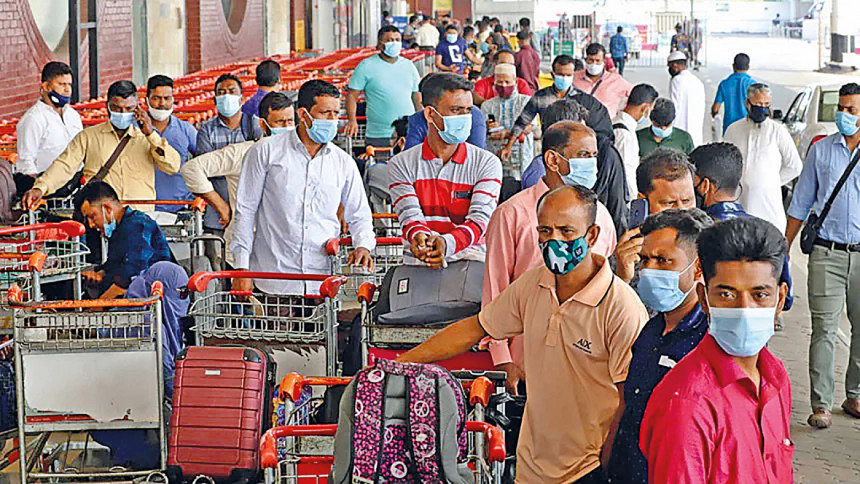Manpower syndicates beyond Dhaka-KL control

"The Malaysian government is committed and very serious about ensuring transparency and the highest ethical standards in the recruitment process," Malaysian High Commissioner to Bangladesh Haznah Md Hashim
The syndicates recruiting Bangladeshi workers in Malaysia are "beyond the control of the two governments", Malaysian High Commissioner to Bangladesh Haznah Md Hashim said yesterday.
She, however, assured that both governments are sincerely working together to improve the recruitment system.
"Of course, there are things that are beyond our control. You [this correspondent] just mentioned the syndicates. This is something beyond not only Malaysia, but also Bangladesh ... [it's] beyond the control of the two governments," she told the media at an interaction session hosted by the Malaysian high commission at a city hotel.
She did not clarify why the syndicates are beyond the governments' control.
Haznah made the remarks when The Daily Star asked about the allegations of irregularities made by four UN independent experts in a letter to the governments of Bangladesh and Malaysia on March 28.
The letter said criminal networks operate in the recruitment process of Bangladeshi workers, who are deceived, recruited by phantom companies and obliged to pay exorbitant recruitment fees, ranging from $4,500 to $6,000. This pushes them into debt bondage.
It added that this goes against the Memorandum of Understanding signed between the two countries in 2021, which allowed charges to be capped at $720.
The Bangladeshi workers pay the highest recruitment fees globally, the letter said.
Haznah said, "I'm not in a position to comment over the allegations."
However, she said the Malaysian government is "committed and very serious" about ensuring transparency and the highest ethical standards in the recruitment process.
"Give us space to do it right for the interest of good relations of the two brotherly countries."
Since August 2022, some 422,000 Bangladeshis have gone to Malaysia for jobs under a syndicate of 100 Bangladeshi recruiting agencies selected by the Malaysian government. They joined some 400,000 other Bangladeshis who had gone there earlier.
Independent researchers say that around 1-2 lakh Bangladeshis are now jobless, unpaid or underpaid, and in debt in Malaysia.
The UN experts' letter further said the recruitment process in Malaysia reportedly begins with bribery within the human resources and home ministry officials of Malaysia to obtain "fake quotas for bogus employers".
"Subsequently, the bribery extends to the Bangladeshi high commission in Malaysia and Bangladeshi syndicated agents to facilitate the recruitment approval. Workers pay fees which go far beyond the actual recruitment costs, in addition to airfare, passport and visa costs, to the syndicate for migration," it read.
Upon arrival in Malaysia, many migrants find that they do not have the job as promised and are forced to overstay their visa validity, risking further exploitation, arrest, detention, ill-treatment and deportation.
Many have become destitute, facing an alarming humanitarian crisis, the UN experts said, adding that the situation requires urgent attention before it escalates further or before lives are further put at risk.
They urged both the governments to ensure that the migrants under consideration do not face reprisals from employers, brokers or government officials for claiming their rights, while also requesting the two countries to hold accountable the employers, recruitment agents and government officials involved in this exploitative process.
The letter was made public by the UN Office of the High Commissioner for Human Rights on May 26 as neither of the governments responded.
An official of Bangladesh's Permanent Mission to the UN in Geneva on Tuesday told this correspondent the Mission was awaiting feedback from Dhaka to respond to the letter.
Since 1997, when Malaysia first began formally recruiting Bangladeshi workers, it repeatedly opened and froze recruitment from Bangladesh. It also offered undocumented migrants the scope to return home by paying a small fee.
There were also initiatives to regularise the migrants' statuses but these processes were often frustrated by unauthorised brokers who deceived the migrants.
Recently, Malaysia set a deadline for workers of 14 source countries to enter Malaysia within May 31 until further notice.
Haznah said this deadline will not be extended. She said this was in the interest of national security as there is already a significant number of undocumented migrants.
Therefore, Malaysia, until the end of this year, is offering the undocumented workers an opportunity to return to their own countries by paying a minimum fee.
Haznah further said the media's focus should not only be on foreign workers but other issues, including trade, healthcare, education and tourism having ample scopes for expansion.
Bangladesh and Malaysia have bilateral trade of $2.6 billion, with the former's export being worth only around $300 million to the latter.
Haznah said signing a Free Trade Agreement can significantly increase Bangladesh's export to Malaysia as well as other ASEAN countries.
Besides, Bangladeshis can also avail themselves of world-standard healthcare in Malaysia, which costs much lower than that of other ASEAN countries, she said.



 For all latest news, follow The Daily Star's Google News channel.
For all latest news, follow The Daily Star's Google News channel. 
Comments